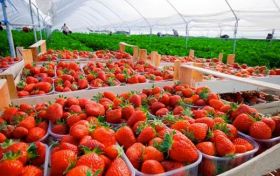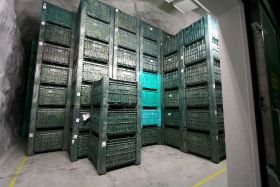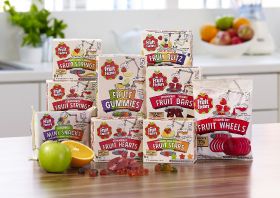Food Manufacturing
Protected Geographical Indication (PGI) West Country Beef has been chosen by Tesco for use in its ‘Finest’ range.
The PGI beef, sourced from Two Sisters Foods in Bodmin, Cornwall, will fill Finest Steak Pies, made by Tamar Foods in Callington, also in Cornwall, for stores nationwide.

/>The West Country PGI status, which covers both lamb and beef, was obtained thanks to work done by strategic advisory body Meat South West (MSW) and other organisations.
Peter Baber, chairman of MSW, said: “We worked incredibly hard to help secure the PGI for both West Country Beef and West Country Lamb. Tesco’s decision to use West Country Beef in its Finest steak and steak and ale pies is a direct result of those efforts.
“It is incredibly promising news for West Country produce. We are delighted with the outcome and the benefits that will bring to the region’s farmers and processors, who can take advantage of the premium status given to the region’s beef and lamb now eligible to carry the PGI.”
To qualify for the protected status, the lamb and beef must be at least 70% forage-fed, and come from stock born, raised and finished in Cornwall, Devon, Somerset, Gloucestershire, Dorset or Wiltshire.
Gary Bound, purchasing manager for Tamar Foods, said: “We are delighted to be able to use PGI West Country Beef in this top-tier product for our retail customer. The recent awarding of PGI status has given us the opportunity to use high-quality, regional beef, which reduces food miles, secures employment locally and adds value to the regional economy.”
Retailer takes action at Dundee branch after incidents which appear to coincide with introduction of 5p carrier bag charge
A Dundee supermarket has been forced to put security tags on its shopping baskets to stop shoppers from stealing them.

Asda told BBC News“a number of baskets” had disappeared from its Milton of Craigie store in the city, and that the incidents appear to coincide with the introduction of a carrier bag charge.
The minimum charge of 5p per carrier bag was introduced by the government in Scotland on 20 October.
A spokesperson for the leading UK retailer said: “Sadly since the carrier bags were first introduced, we have lost a number of baskets.
“We have reluctantly introduced security tags to ensure all our customers can carry out their shopping without disruption.”
The Asda spokesperson noted that the measure was not being rolled out across the country.
A full schedule of in-store marketing events are planned for Germany, Denmark, Poland, UK and Sweden to promote the benefits of pears
Pears will be the main focus of the Fruitness, Enjoy it! campaign organised by Italy’s CSO Fruit & Vegetable services centre and co-financed by the European Union and the Italian agriculture ministry to promote Italian fruits and vegetables Germany, Denmark, Poland, Sweden and the UK.
A series of promotional events are scheduled to take place in various supermarkets in these countries, all centered on pears.

“Pears possess numerous virtues from a health point of view, and by carrying out dedicated promotion activities in the main supermarkets in these five countries the Fruitness campaign aims to increase consumer awareness of the benefits of regular pear consumption for all members of the family,” the campaign’s organisers said in a press release.
The many benefits of pears include their richness in natural sugars, low calorie content (roughly 100 calories in an average-sized 160g pear), and high fibre content, which assists intestinal regularity and helps keep cholesterol levels down.
“An average-size pear also contains roughly 210mg of potassium, an important element in sustaining muscle contraction (and therefore exercise and sport), nerve transmission and protein metabolisation. Last but not least, pears also contain plentiful vitamin C (roughly 7 mg per pear), excellent for maintaining a youthful skin and boosting the immune system,” the statement said.
According to figures published at Prognosfruit, the annual conference devoted to estimates of international apple and pear production, Italy emerged again as Europe’s top pear producer, with a production forecast of 707,000 tonnes, slightly down (- 3%) on 2013. Spain has the next highest volume, with a forecast of 371,000 tonnes for 2014, a fall of 8 per cent on last year. In third place is the Netherlands which, unlike the majority of European countries, actually shows an increase in production, with 336,000 tonnes forecast for 2014, a 3% increase compared to 2013 and 17% up on the last three years.
The “Fruitness, Enjoy it!” project was first launched in 2006, and as well as pears focuses on peaches, nectarines, kiwifruit, apricots and plums. Since its launch, 35m contacts have been made with the www.fruitness.eu/ website, notching up over 9.2m individual users per month. This figure is complemented by a further 25m contacts through traditional Press Office and Public Relations activities, and 10m through banner campaigns in sector websites.
New funding released by Defra will boost nine horticultural agri-tech projects support growth in agri-science sector
Several fresh produce research projects will receive £12.1 million in government funding, it has been announced.

Out of the 15 agri-tech Catalyst Award winner, nine are within horticulture and five are specifically centred around fresh produce.
Defra said the investment will help support growth in the agricultural science and technology sectors in the UK.
The winning horticulture agri-tech projects were:
– ‘New strawberries optimised for growing without soil’, run by East Malling Research, Agrovista, Botanicoir, CPM Retail and Sainsbury’s.
– ‘Antimicrobial technology to control disease in potato production’, run by, Advanced Pest Solutions, Agrico, Branston, McCain Food, Science and Advice for Scottish Agriculture (SASA) and Scottish Agronomy.
– ‘Using light to extend the shelf-life of fresh produce’, run by Finlay Flowers, Adas, Lambda Photometrics, May Barn Horticultural Consultancy, North Bank Growers, Nutricycle, University of Nottingham and Wight Salads Group.
– ‘An automated system for precision application of fertiliser and plant growth compounds’, run by Growhow, Adas, Chris Harry-Thomas Consulting, Hill Court Farm Research, Patchwork Technology, Precise Crop Nutrition and Syngenta.
– ‘Developing technology for an organic natural based pesticide’, run by Hockley International, Almac Sciences and Bangor University.
– ‘Improving efficiency and reducing environmental harm of fertiliser production’, run by ITM Power, BPE Design and Support, Fera, University of Sheffield and Waitrose.
– ‘Increasing the efficiency and quality of strawberries grown without soil’, PlantWorks, Agrovista, Berry Gardens and East Malling Research.
– ‘Protecting peas and beans from beetles without blanket insecticide spraying’, run by Processors and Growers Research Organisation, BASF, Exosect, Oecos and Rothamsted Research.
– ‘Optimising “big data” to drive improvements in crop production and utilisation’, run by Produce World and Cranfield University.
UK meat leaders have expressed disappointment over the reporting of a US-based study which claimed that beef production was 10 times more damaging to the environment than other livestock.
The study, published in the Proceedings of the National Academy of Sciences (PNAS), claimed that by applying a uniform methodology to data from the US Departments of Agriculture, the Interior and Energy, it showed that beef was far ahead of other proteins when it came to environmental impact.
A summary of the study said: “The authors found that impacts of dairy, poultry, pork, and eggs were mutually comparable within a factor of two. Beef, however, required 28 times more land, 11 times more irrigation water, five times more greenhouse gas emissions, and six times more reactive nitrogen fertiliser than the respective average burdens of the other four livestock categories.

”Plant-based production, however, including potato, wheat and rice, on average needed “two to six times fewer resources per calorie consumed than non-beef livestock”, it added.
The news has been widely reported across mainstream media, but UK meat bosses have hit back at the coverage, which they said failed to recognise that US production differed considerably from UK grass-fed production.
Nick Allen, sector director for red meat levy body Eblex, said: “Our rain-fed pasture system means we have one of the most efficient and sustainable livestock production systems in the world. In the UK, cattle and sheep primarily convert grass, which cannot be used to feed people, into nutritious food for our growing population. We have very little reliance on irrigation; in fact it takes just 67 litres of water to produce 1kg of beef.
“There are also additional environmental benefits of grazing ruminants, not least in terms of landscape management and maintaining biodiversity, yet livestock production still comes in for undue criticism.
”One of the authors of the report Professor Gidon Eshel, speaking to The Guardian newspaper, acknowledged that US grain-fed production systems exacerbated the issues surrounding feed inefficiency, but he said that even grass-fed cattle had greater environmental footprints than other animal products.
He said the aim of the study was to change the consumer mind-set: “While my work in recent years has clearly demonstrated that plant-based diets exact lower environmental costs than animal-based ones, in the new paper we recognise that this and related work by others have changed little in US diets; people still eat animal-based products with an ever-increasing gusto.
“Our study has a number of implications. First, it can help environmentally minded individuals make environmentally better dietary choices. Perhaps more importantly, the paper can also help inform US agricultural policy.”
Poultry processor Moy Park has revealed plans for an expansion of three of its sites, which will create 628 new jobs.

The company, part of the Marfrig Global Foods group, has announced it will expand its three sites in Northern Ireland – at Dungannon, Ballymena and Craigavon – through a £170 million investment. The investment will include new processing lines and a new innovation centre.
Enterprise, trade and investment minister Arlene Foster said: “This investment, which will mean a £10.5m increase in wages and salaries annually for the local economy, is a huge boost of confidence in Northern Ireland as a European food production and manufacturing centre of excellence by a world-leading company.
“The expansion will further enhance Moy Park’s contribution to the local economy by enabling the business to achieve substantial growth in sales, mostly to customers outside Northern Ireland, by 2018.”
The 628 new jobs, 100 of which have already been posted will include roles in management, supervisory, processing and financial shared services. Foster said the announcement “is a sign of Marfrig’s on-going commitment to Northern Ireland. The new jobs are being created over a four-year period across Moy Park’s three sites, with a variety of roles available, including 70 high-value posts based in the new Innovation Centre.”
Marfrig Global Foods CEO Sergio Rial commented: “We are committed to growing our operations in Northern Ireland and this investment, with support from Invest Northern Ireland, helps us to achieve that. We have had ongoing, positive engagement with the Northern Ireland Executive and have experienced a very pro-business attitude.”
UK’s second largest retailer will store golden delicious apples under the Italian Alps as alternative to high-energy storage system

Asda has announced it will store up to 50,000 golden delicious apples in caves under the Italian Alps to reduce its carbon footprint.
The initiative, a world-first for a retailer, is in partnership with Italian apple supplier Melinda.
It aims to save 60% of electricity needed to store the same quantity in a refrigerated warehouse, and is designed to reduce water consumption, land use and decrease C02 emissions.
The cave space in Val di Non, in the Trentino region of northern Italy, is located around 800 metres into the mountain. Each of the five storage spaces are around 144 by 60 metres, comparable to the size of two Boeing 747 aeroplanes.
“This is a really exciting project which we’ve been working on for over two years,” said IPL category manager Martin Smith. “The first time I visited the mountain site it was a completely unique and unforgettable experience, and it’s really exciting to know that our shoppers have the chance to enjoy apples with such an innovative story.”
The project is due for completion in 2019.

New retailer listing for convenience fruit snacks from prepared company Humdinger
Snack firm Humdinger has won an Asda listing for its branded Fruit Factory potted fruit snacks from 19 May 2014.
The brand is now stocked in all major retailers across the UK.
It will be available in Asda in multipacks consisting of Strawberry, Apple & Orange Fruit Strings, Strawberry Fruit Hearts, Strawberry, Apple & Orange Fruit Stars and Lunchbox Mini Snacks. The pack RRP will between £1.49 and £1.99.
Carl Widdop, brand manager at Humdinger, said the company is looking to expand further during 2014.
“We’re delighted to announce that The Fruit Factory products will soon be available in Asda stores nationwide,” he said. “It’s a great start to the year for the brand to have secured listings in all the UK’s major supermarkets.”
Humdinger distributes dried fruit and savoury snacks under the Humdinger and The Fruit Factory brands, as well as licensed products from Budweiser, Marmite and Vimto.